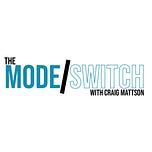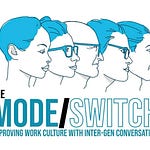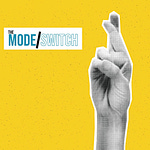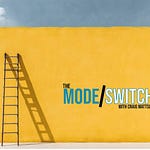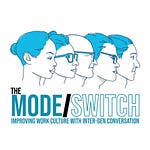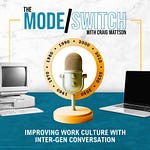Volume 1, Issue 15
Job-training and on-boarding for Gen Z professionals tends to suck. Or so I gathered from Dyvon Melling’s story one warm night in the summer of 2021, when he and I sat down at some mics in downtown Chicago just before supper. He told me stories about his managerial work at a stealth enterprise in Los Angeles. (If I told you the name of the company, we’d have to deep-six the Mode/Switch.) As you’ll see in the edited transcript below, Dyvon has a blunt communication style, shaped by disillusionment with corporate capitalism, racial inequity, and the fact that our mics were the only thing standing between us and a pasta dinner. One thing Dyvon taught me, though, was how hard it is to learn anything on the job unless the manager is riskily transparent.
Note, this transcript has been condensed and edited for quickness and clarity. You will hear a fuller version in the podcast when we re-attach it. We’re aware of some audio issues with the full version and will upload a corrected version of the audio in the next few days—apologies for the inconvenience!
Craig: You just got off the train. So let’s imagine an elevated train map showing all the stops. What would that map look like for your professional journey? You get out of college—what’s the next stop? What’s it feel like to do you?
Dyvon: Like, I have to set the world on fire with my passion. I started working over here at Future Founders [at the Chicago-based entrepreneurial incubator 1871]—a good place for me to realize that I didn't know as much as I thought I knew. I just did not have the skills.
Craig: Could you talk a little bit more about that?
Dyvon: I'd never run anything. They didn't have anybody else doing what they wanted me to do that I could watch. And so, my usual avenues of learning were just gone.
Craig: How does that affect your managerial work today?
Dyvon: Typically, my white peers know how to communicate in casual networking. I'm biracial. I find that it's still hard for my employees of color—particularly black employees—to not try to figure things out on their own.
Craig: I tend to think of racial dynamics the other way around: white people tend to embrace individualist values, and—
Dyvon: I would argue the opposite.
Craig: Say more.
Dyvon: White folks built their wealth by—they had very strong communities and knew how to network within their churches. They knew how to share their money and share their resources and train each other's kids. I think only poor whites are individualists. I think wealthy whites have their wealth because they chose a community a long time ago that is hard to break into.
Craig: Point taken. There’s an appearance of individualism among white entrepreneurs, but—
Dyvon: I think networking is an overlooked superpower of most white folks. I thought I had to be tasteful and subtle about it. But my friends are really good at it. They're very overt about it. They ask for exactly what they want.
Craig: Take us to your next stop.
Dyvon: Yeah, so from there, I was very disillusioned, because that was a very purpose-driven job. It was all about helping the youth and making the world better through small businesses and stuff. And I really believed it. But I saw [that] the white women typically did better than the black men who typically did better than the brown women. I was like, Ok, we can help a little bit, but those who are succeeding are the people you'd expect to succeed.
Craig: The hierarchy is still in place.
Dyvon: Yeah. I became an anti-capitalist. I worked for a small brewery [in Idaho]. Eventually I went to L.A. I worked for a little startup called Tipsy Elves. (They sell ugly Christmas sweaters and apparel and stuff.) Then I started working at my current company, a stealth mode food tech startup. I've been there for close to two years now. And now we have tons of stuff all over the world.
Craig: So those are the stops. Let’s talk about the managerial habits that got you from there to here.
Dyvon: My value to this company is no longer in time or how much I can even produce, but how well I can communicate issues to other teams. How well I can rally my team to efficiently complete work. How well I can solve problems that nobody else knows how to solve. For the first time, I understand enough to be proactive.
Craig: In setting a vision for your team or--? What do you mean proactive?
Dyvon: I could see a small problem in our process and just let completely overhaul things—and tell other people on other teams, Hey, we saw this problem that affects you. We're gonna fix this. We just need you to do this.
Craig: So, logistically proactive?
Dyvon: Yeah. I moved from people management to process management.
Craig: What is your go-to mode of communication as a manager? Some people are, Let’s have the conversation. Some people are, Let’s write the long email blast. Other people rely on signaling. Talk about your proactive style.
Dyvon: I’m often on record in meetings saying, Let's make the implicit explicit. I still have a pretty diverse team, and I don't assume that everybody knows the same things. (Two of my employees are Mandarin first-language speakers.) When you have 10, 11, 12 people, some very young, some in their late 30s, there's just so much that can be missed.
I have a weekly meeting with each one of my employees, so I can say anything they need to hear. They can say anything to me. They can ask for help. They can ask for more training. They have half an hour of my time every week.
Craig: And that’s the conversation that brings the tacit into the explicit.
Dyvon: A lot of people's workplaces are built on gossip. As soon as I hear the drama, I tell the person who should know about it. And then I try to help them change it. Or I defend them to the people. Probably both. I don't like any of the shadow stuff.
One of the things that I really struggled with in my first job was [the] biannual review. My 6-month review, I was like, I think I'm a pretty good employee. And then, here's a 3-page list with dates and times of areas where you did not meet our expectations, and I was absolutely devastated. Why didn't you tell me these as that happened? I thought I was doing well, and now I have to change everything about the way I've worked. I make sure that nobody who works for me is in that position.
Craig: There are conspicuous strengths to your approach to management. Are there any weaknesses?
Dyvon: Yeah. Our company is not very good at paying people, and so I've been pretty transparent about the company’s pay practices. And my company cut my pay as part of my promotion. My employees knew that, and it really demotivated them. I can be too transparent. So there's a line and a balance, and I think it moves.
Craig: I'm grateful for this talk, Dyvon.
Dyvon: It's a pleasure.
Craig: Let's get some dinner.
Dyvon: Sounds good.
Enjoying The Mode/Switch? Maybe you have something to share about your own experience—simply reply to this email if you’re an early-career professional up for an interview! - Craig

